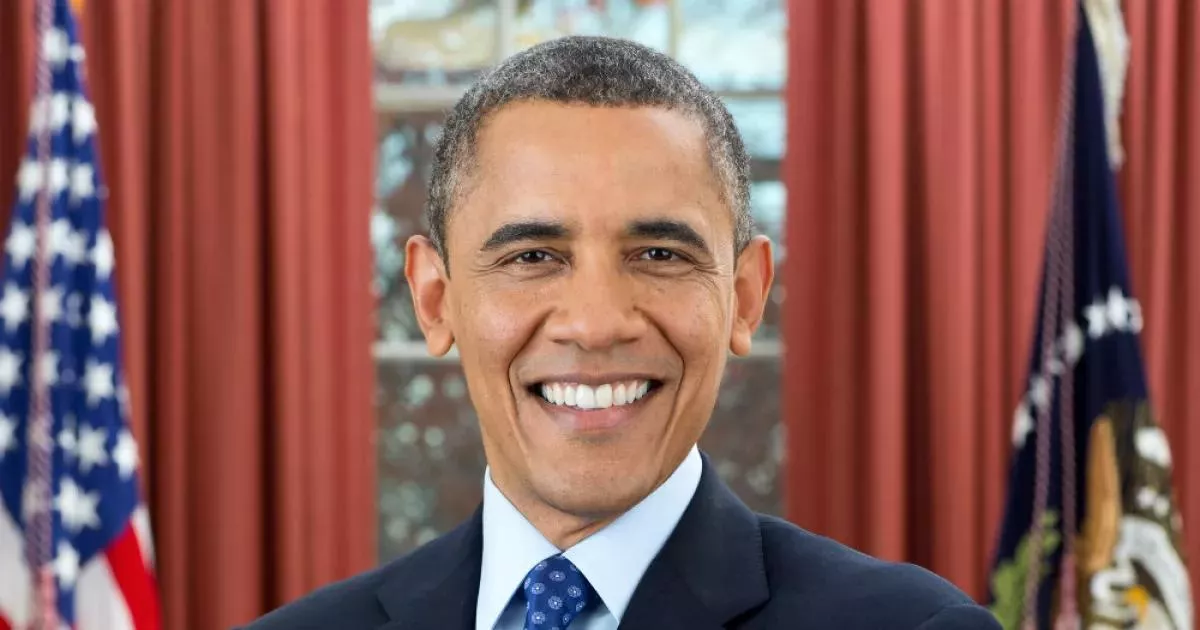A closer look at the most debated and controversial moments involving Barack Obama.
Barack Obama, the 44th U.S. President (2009-2017), was the first African American to hold the office. A Democrat, he served as a U.S. Senator for Illinois (2005-2008) and an Illinois State Senator (1997-2004). His presidency was marked by the Affordable Care Act, the end of the Iraq War, and the killing of Osama bin Laden. Prior to his political career, Obama was a community organizer and civil rights attorney. He is a graduate of Columbia University and Harvard Law School.
1993: Don't Ask, Don't Tell Policy
In 1993, the 'don't ask, don't tell' policy was implemented, preventing gay and lesbian people from serving openly in the United States Armed Forces until it was repealed in 2010.
March 2003: Address at Anti-War Rally
In March 2003, Barack Obama addressed another anti-war rally and told the crowd "it's not too late" to stop the war.
August 2007: Obama Addresses Questions About His Identity
In August 2007, at a meeting of the National Association of Black Journalists, Obama addressed questions about whether he was "black enough," expressing puzzlement over the notion that appealing to white people implies something is wrong.
May 2008: Resignation from Trinity United Church of Christ
In May 2008, during his first presidential campaign, Barack Obama resigned from Trinity United Church of Christ after some of Jeremiah Wright's statements were criticized.
June 26, 2009: Condemnation of Iranian Government's Actions
On June 26, 2009, President Obama condemned the Iranian government's actions towards protesters following Iran's 2009 presidential election.
July 2009: Launch of Priority Enforcement Program
In July 2009, Obama launched the Priority Enforcement Program, an immigration enforcement program that had been pioneered by George W. Bush, and the Secure Communities fingerprinting and immigration status data-sharing program.
March 2010: Obama Opposed Israeli Housing Projects in East Jerusalem
In March 2010, President Obama took a public stance against plans by the government of Israeli prime minister Benjamin Netanyahu to continue building Jewish housing projects in predominantly Arab neighborhoods of East Jerusalem.
March 31, 2010: Ending Ban on Oil and Gas Drilling
Prior to the Deepwater Horizon oil spill, on March 31, 2010, President Obama ended a ban on oil and gas drilling along the majority of the East Coast of the United States and along the coast of northern Alaska. This action was taken in an effort to win support for an energy and climate bill and to reduce foreign imports of oil and gas.
April 2010: Space Policy Speech
In April 2010, Obama announced a change in direction at NASA, ending plans for a return of human spaceflight to the moon and development of the Ares I rocket, Ares V rocket and Constellation program, in favor of funding earth science projects and an eventual crewed mission to Mars.
April 20, 2010: Deepwater Horizon Oil Spill
On April 20, 2010, an explosion destroyed an offshore drilling rig at the Macondo Prospect in the Gulf of Mexico, causing a major sustained oil leak. President Obama visited the Gulf, announced a federal investigation, and formed a bipartisan commission to recommend new safety standards. He also announced a six-month moratorium on new deepwater drilling permits and leases, pending regulatory review.
2011: Military Intervention in Iraq After Gains Made by ISIL
Following the 2011 withdrawal from Iraq, Obama ordered military intervention in Iraq after gains made by ISIL.
2011: Renewal of Patriot Act
In 2011, Obama signed a four-year renewal of the Patriot Act.
2011: Drone Strike Killing Anwar al-Awlaki
In 2011, President Obama ordered a drone strike in Yemen which targeted and killed Anwar al-Awlaki, an American imam suspected of being a leading Al-Qaeda organizer. al-Awlaki became the first U.S. citizen to be targeted and killed by a U.S. drone strike, leading to significant controversy.
2011: United States Vetoed Resolution Condemning Israeli Settlements
In 2011, the United States, under President Obama, vetoed a Security Council resolution condemning Israeli settlements, being the only nation to do so.
June 28, 2012: Supreme Court Ruling on ACA Mandate
On June 28, 2012, the Supreme Court ruled by a 5–4 vote in National Federation of Independent Business v. Sebelius that the individual mandate in the Affordable Care Act (ACA) was constitutional under the U.S. Congress's taxing authority.
January 16, 2013: Gun Control Proposals
On January 16, 2013, one month after the Sandy Hook Elementary School shooting, Obama signed 23 executive orders and outlined a series of proposals regarding gun control, including urging Congress to reintroduce an expired ban on military-style assault weapons and introduce background checks on all gun sales.
July 2013: Reservations on Keystone XL Pipeline
In July 2013, President Obama expressed reservations and said he "would reject the Keystone XL pipeline if it increased carbon pollution [or] greenhouse emissions."
August 2013: Obama Criticizes Russia's Anti-Homosexual Law
In August 2013, Obama criticized Russia's law that discriminated against homosexual people, but he refrained from advocating a boycott of the 2014 Winter Olympics in Sochi, Russia.
2013: Global Surveillance Disclosures
Following the 2013 global surveillance disclosures by Edward Snowden, Obama condemned the leak as unpatriotic but called for increased restrictions on the National Security Agency (NSA) to address violations of privacy.
2013: Obama's View on Israeli Settlements
In 2013, Jeffrey Goldberg reported that, in Obama's view, "with each new settlement announcement, Netanyahu is moving his country down a path toward near-total isolation."
2014: Obama Discusses Racial Disadvantages
By 2014, Obama began openly discussing the disadvantages faced by many members of minority groups, marking a shift in his approach to addressing racial issues.
February 24, 2015: Veto of Keystone XL Pipeline Bill
On February 24, 2015, President Obama vetoed a bill that would have authorized the Keystone XL pipeline. It was the third veto of his presidency and his first major veto.
June 2015: Supreme Court Ruling in King v. Burwell
In June 2015, the Supreme Court ruled 6–3 in King v. Burwell that subsidies to help individuals and families purchase health insurance were authorized for those doing so on both the federal exchange and state exchanges, not only those purchasing plans "established by the State", as the statute reads.
July 14, 2015: Deal Announced on Iran's Nuclear Program
On July 14, 2015, a deal called the "Joint Comprehensive Plan of Action" was announced regarding Iran's nuclear program, leading to the removal of sanctions in exchange for measures preventing Iran from producing nuclear weapons. This deal was met with both praise and criticism.
2015: Criticism of Obama for Advocating Iran Nuclear Deal
In 2015, President Obama was harshly criticized by Israel for advocating and signing the Iran Nuclear Deal; Israeli prime minister Benjamin Netanyahu said the deal was "dangerous" and "bad."
January 5, 2016: Executive Actions on Gun Control
On January 5, 2016, Obama announced new executive actions extending background check requirements to more gun sellers, continuing his efforts to address gun violence.
March 2016: Worries About Race Relations
In a March 2016 Gallup poll, nearly one third of Americans said they worried "a great deal" about race relations, a higher figure than in any previous Gallup poll since 2001.
December 23, 2016: U.S. Abstains from UN Resolution Condemning Israeli Settlements
On December 23, 2016, under the Obama administration, the United States abstained from United Nations Security Council Resolution 2334, which condemned Israeli settlement building in the occupied Palestinian territories, effectively allowing it to pass.
2016: Sanctions against Russia Following Election Interference
In 2016, Obama initiated sanctions against Russia following Russian interference in the U.S. elections.
2016: Obama's Regret Over Libya Intervention
In 2016, President Obama said "Our coalition could have and should have done more to fill a vacuum left behind" and that it was "a mess" regarding the Libyan intervention. He stated that the lack of preparation surrounding the days following the government's overthrow was the "worst mistake" of his presidency.
2016: Russian Interference in U.S. Presidential Election
In 2016, Russia interfered in the U.S. presidential election, a controversial event that led to discussions about its potential impact on the election's outcome.
2016: Obama Administration Proposed Arms Deals with Saudi Arabia
In 2016, the Obama administration proposed a series of arms deals with Saudi Arabia worth $115 billion. Later, Obama halted the sale of guided munition technology to Saudi Arabia after Saudi warplanes targeted a funeral in Yemen, killing more than 140 people.
January 5, 2017: U.S. House Condemned UN Resolution
On January 5, 2017, the United States House of Representatives voted 342–80 to condemn the UN Resolution.
January 6, 2017: Israel Withdrew Dues from the UN
On January 6, 2017, the Israeli government withdrew its annual dues from the United Nations, which totaled $6 million, in response to the UN Resolution.
2017: Penalty for violating individual mandate repealed
In 2017, the penalty for violating the individual mandate of the Affordable Care Act was repealed, effective in 2019.
2019: Penalty for violating individual mandate repealed
In 2019, the penalty for violating the individual mandate of the Affordable Care Act was repealed, effective in 2019.
October 2023: Obama Addresses Gaza War
In October 2023, during the Gaza war, Obama stated that Israel must dismantle Hamas following the October 7 attacks. He later cautioned that Israel's actions could "harden Palestinian attitudes for generations" and diminish international support, warning that any military strategy neglecting the war's human costs "could ultimately backfire."
Mentioned in this timeline

Donald John Trump is an American politician media personality and...

Pope Francis served as the head of the Catholic Church...

Michelle Obama an American attorney and author served as the...

Bill Clinton the nd U S President - served as...

Hillary Diane Rodham Clinton is a prominent American politician lawyer...

John F Kennedy JFK was the th U S President...
Trending

54 minutes ago Selena Gomez's Spiced-Plum Manicure and TikTok Clone Theory Spark Buzz

55 minutes ago Kit Harington and Sophie Turner Gag After On-Screen Kiss in New Movie

55 minutes ago Trump administration updates, Iran nuclear efforts, and White House controversies unfold.

55 minutes ago Dario Amodei Highlights India's Central Role in Shaping AI's Future at AI Summit.

2 hours ago Yoon Suk Yeol, South Korean ex-president, receives life sentence for insurrection and martial law.

4 hours ago Maya Hawke and Christian Lee Hutson celebrated wedding with Stranger Things cast present.
Popular

Jesse Jackson is an American civil rights activist politician and...
Randall Adam Fine is an American politician a Republican who...

Pam Bondi is an American attorney lobbyist and politician currently...

Barack Obama the th U S President - was the...

Martin Luther King Jr was a pivotal leader in the...

Ken Paxton is an American politician and lawyer serving as...
